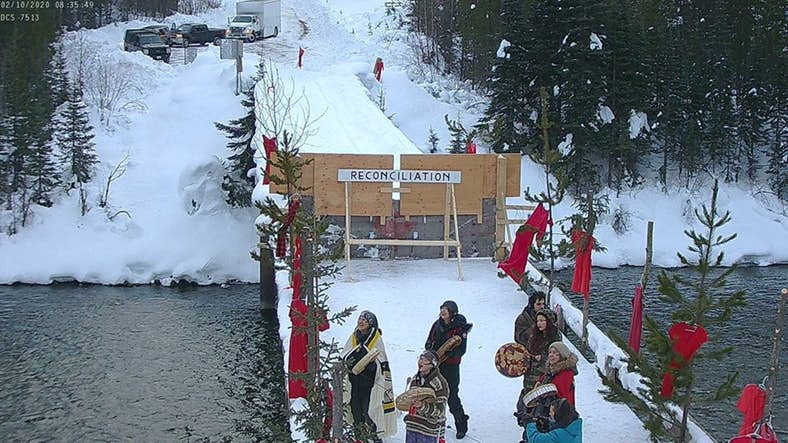Mahdis Habibinia | Executive Editor, Online
Shahroze Rauf | News Editor
Featured Image: The conflict between Coastal GasLink and the Wet’suwet’en community has sparked protests across Canada, blocking main rail routes. | Courtesy of newsmaven.io
At the centre of Canadian discourse remains the weeks-long tensions that have been rising as railway blockades and protests in support of the Wet’suwet’en hereditary chiefs continue.
The OPP sent dozens of officers to the Tyendinaga blockade this past Monday to dismantle it. Protestors at the blockade, in solidarity with the Wet’suwet’en protests against the Coastal GasLink pipeline, had been blocking traffic on the railroads in the Belleville area for more than two weeks.
The Coastal GasLink pipeline is a $6-billion, 670-kilometre project meant to transport natural gas from Dawson Creek, in northeastern B.C., to a coastal LNG Canada export terminal in Kitimat.
Coastal GasLink signed agreements with 20 elected Indigenous councils for this construction, but the pipeline is opposed by some of the Wet’suwet’en hereditary chiefs. The latter claim rights over the unceded land that the pipeline will pass through. The chiefs and their supporters are demanding the B.C. government withdraws permissions for the project to continue.
Across the country, Canadians have gathered in solidarity with the Wet’suwet’en Nation, protesting and blocking rails, streets, bridges, and ports. Via Rail has cancelled most of its service across Canada, and CN has shut down its rail network in Eastern Canada.
“The RCMP are inflicting force and terror on a group of people who acquired land fairly and justly and are now being criminalized for following the same exact laws the government laid out for them.”
Nationwide protests began in early February after the RCMP began enforcing an injunction that would clear the way for construction of the pipeline. Then on February 6, the RCMP began making arrests and clearing the way for Coastal GasLink workers.
“This is not the outcome we wanted. We have made exceptional efforts to resolve this blockade through engagement and dialogue,” said Coastal GasLink President David Pfeiffer in a statement posted on their website.
“The RCMP are inflicting force and terror on a group of people who acquired land fairly and justly and are now being criminalized for following the same exact laws the government laid out for them,” says second-year Seneca@York journalism student Matt McCune.
According to a statement released by the OPP, its liaison team tried to negotiate with protesters over the past few weeks, but “decided to take action to uphold an injunction to clear the railway.”
“We have remained respectful of the ongoing dialogue, including issues of sovereignty between our Indigenous communities and various federal ministers, and have hoped for productive communication leading to a peaceful resolution,” said OPP spokesperson Bill Dickson.
This was following Prime Minister Justin Trudeau’s emergency Incident Response Group meeting. After the meeting, Public Safety Minister Bill Blair announced support for the government’s decision to end these blockades.
“Other than highlighting our prime minister’s inability to solve problems, I fail to see further benefits to this form of protests. Similar to how our local CUPE unit incorrectly believed halting traffic would propel their agenda forward, the rail blockade seems to only succeed in upsetting Canadians, pushing them further from sympathy.”
“Other than highlighting our prime minister’s inability to solve problems, I fail to see further benefits to this form of protests,” says English MA student at York Ethan Saks. “Similar to how our local CUPE unit incorrectly believed halting traffic would propel their agenda forward, the rail blockade seems to only succeed in upsetting Canadians, pushing them further from sympathy.”
However, solidarity protests and support for the hereditary chiefs remain prevalent. York University’s School of Social Work provided an official statement of solidarity with the Wet’suwet’en community.
“We seek to lend our voices to the chorus of those in support of the Wet’suwet’en people, their clan governance systems, and hereditary chiefs, while also condemning the actions of the Canadian government for violently interfering on this territory and with the bodies of those defending the land and its people,” the statement read.
The York Federation of Students also offered their support, sending an official letter to B.C. Premier John Horgan and Prime Minister Trudeau, citing the actions of the Canadian government as unlawful and infringing upon indigenous sovereignty.
“The Wet’suwet’en live on unceded territory — their rights and title to their land have never been relinquished; the actions of your government fail to respect that, only furthering colonial violence,” the letter read.
Though individuals like McCune echo these sentiments and support the protestors, Saks feels that drastic protests such as the railroad blockades will only lead Canadians further away from reconciliation with Indigenous communities.
“Protests can not block a court house because they inhibit the administration of justice. Why are we allowing groups to inhibit movement as well? I feel as though there are better ways to get this point across — a way that does not degrade the rights of other Canadians, and a way that aims to make Canadians sympathetic with their views rather than admonish them,” says Saks.
With files from CityNews and The Canadian Press




